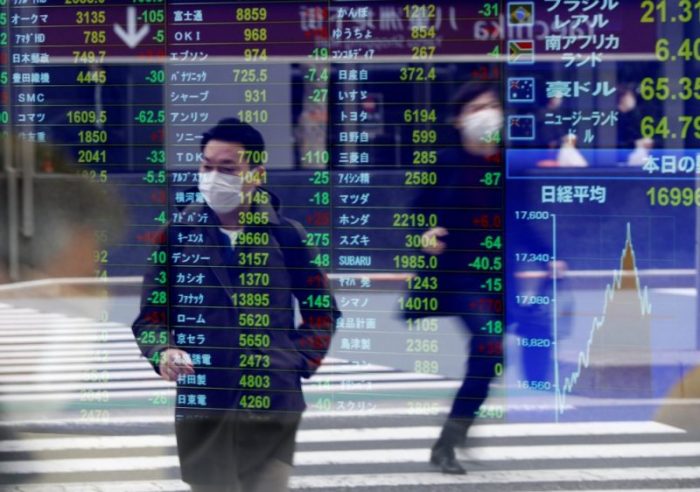Asia’s traders were in a downbeat mood on Monday as inflation concerns returned to the fore, while a further slowdown in China’s economic growth reinforced worries about its stuttering recovery.
The tepid performance across the region’s trading floors followed a healthy run last week across the world fuelled by a strong start to the earnings season, which helped distract from surging prices.
However, a further rise in the oil market – WTI is at a seven-year high and Brent is at a three-year peak – has refocused attention on the threat of inflation.
‘Ugly numbers’: All Is Not Well With China’s Economy from AsiaFinancial on Vimeo.
Data last week showed Chinese factory-gate costs at their highest in a quarter of a century in September, while US wholesale inflation hit a record. And on Monday, New Zealand said prices rose at their quickest rate in a decade.
That has increased pressure on central banks around the world to tighten the easy money policies put in place at the start of the Covid-19 pandemic, which have been key to a strong economic and equity market recovery.
Some banks – including in South Korea and New Zealand – have already hiked borrowing costs while the Bank of England has indicated it is close.
Meanwhile, the US Federal Reserve is expected to begin paring its bond-buying programme before the end of the year, and some observers are suggesting it could lift interest rates possibly before 2023.
The prospect of higher rates and less cheap cash has weighed on sentiment for several months and reassurances that inflation would only be temporary have been overtaken by the surging energy costs caused by reopenings around the world and a recovery in demand.
The lifting of travel restrictions into the United States from next month will likely add further upward pressure to prices.
China Growth Slumps to One-Year Low on Power, Property Drags
China Real Estate Sector Crisis
Tokyo, Shanghai, Seoul, Wellington and Taipei fell but there were gains in Hong Kong, Sydney, Manila, Mumbai, Bangkok and Jakarta. Singapore was flat.
The benchmark Nikkei 225 index edged down 0.15%, or 43.17 points, to 29,025.46, while the broader Topix index fell 0.23%, or 4.70 points, to 2,019.23.
The Hang Seng Index rose 0.31%, or 78.79 points, to 25,409.75. The Shanghai Composite Index eased 0.12%, or 4.23 points, to 3,568.14, while the Shenzhen Composite Index on China’s second exchange edged up 0.06%, or 1.53 points, to 2,402.04.
China announced on Monday that its growth had eased to 4.9% in July-September, slightly slower than forecasts, as a crackdown on the real estate sector dealt a severe blow to a crucial part of the economy.
That has come at the same time as a worsening energy crunch across the country – partly caused by government emissions targets – that has forced some businesses to scale back activity.
Supply Chain Issues
“It’s not hard to understand why [the data] has disappointed with the various port disruptions seen throughout the quarter due to Covid restrictions, supply chain issues, as well as surging power costs and enforced shutdowns of the Chinese economy,” Michael Hewson of CMC Markets said.
“The performance of the economy hasn’t been helped by the various crackdowns by Chinese authorities on various parts of the economy, as well as the problems around Evergrande and the property sector.”
Still, there was some joy for investors in comments at the weekend from the People’s Bank of China, with top officials saying the risk of spillover from embattled property giant Evergrande to the financial sector was “controllable.”
Bitcoin rose above $62,500 as it homed in on its record high, with optimism that the Securities and Exchange Commission will allow the first US exchange-traded fund for cryptocurrency futures to begin operating this week.
The digital currency hit its all-time high of $64,870 in April before plunging on Chinese regulatory concerns.
MARKETS
Tokyo > Nikkei 225: DOWN 0.2% at 29,025.46 (close)
Hong Kong > Hang Seng Index: UP 0.3% at 25,409.75 (close)
Shanghai > Composite: DOWN 0.1% at 3,568.14 (close)
New York > Dow: UP 1.1% at 35,294.76 (close)
- AFP with additional editing by Sean O’Meara
Read more:
China’s Power Woes May Worsen Amid Demand Surge, Coal Lag
China Property Shares Drop On Tax Worry, Signs of Weakness
























